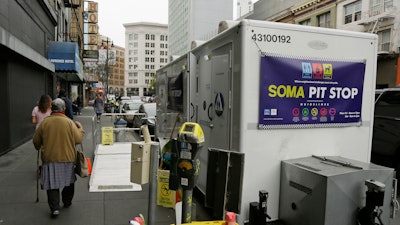
SAN FRANCISCO (AP) — The sidewalks surrounding Ahmed Al Barak's corner market in one of San Francisco's roughest neighborhoods are filled with cardboard, used syringes and homeless people who have nowhere safe to go at night.
But Al Barak says it's an improvement from a year ago, before the city posted a portable toilet across the street from his business in the city's Tenderloin district.
He no longer regularly sees people relieve themselves in broad daylight, and he doesn't see as much feces and urine on the streets. In his opinion, it's the one bright spot in a city where taxes are too high.
"We used to have a disaster here. I used to call the city all the time to come and clean, because they don't know where to go," he said, recalling one woman in particular who shrugged at him in a "what can you do?" gesture as she squatted to pee.
San Francisco started its "Pit Stop" program in July 2014 with public toilets in the city's homeless-heavy Tenderloin, after children complained of dodging human waste on their way to school. Today, the staffed bathrooms have grown from three to 25 locations, and the program has expanded to Los Angeles. In May, the toilets in San Francisco recorded nearly 50,000 flushes, all logged by attendants.
The condition of San Francisco's streets has been a source of embarrassment to city leaders, and cleaning up is not cheap. The city received nearly 27,000 requests for feces removal in the most recent fiscal year, although not all are human.
Mayor London Breed last year announced the formation of a special six-person "poop patrol" team where each cleaner earns more than $70,000 a year.
Advocates say steam cleaning requests have dropped in areas surrounding some of the public toilets. The mayor signed a budget Thursday that includes money for seven new Pit Stop bathrooms for a city where a one-night count of homeless people grew 17% in the past two years. The toilets each cost an average of $200,000 a year to operate, with most of the money going to staffing and overhead.
Some of the bathrooms are permanent fixtures, while others are portables with two toilets that are trucked in and out. The stops have receptacles for used syringes and dog waste. Attendants who are paid the city's minimum wage of $16 an hour check after every use and knock on doors to make sure people are not doing drugs or other illicit activity. The bathrooms must shine or they do not open.
The staffing is what makes a toilet a Pit Stop, and the work is usually done by men coming out of prison after decades behind bars.
The "practitioners" stand guard at some of society's bleakest intersections of poverty, addiction and mental illness, says Lena Miller, founder of nonprofit Hunters Point Family and its spinoff, Urban Alchemy, which staffs the Pit Stops in San Francisco and Los Angeles. They prevent overdoses, break up fights and greet regulars, she says.
"Really what we're doing is we're creating this space where people know that they can walk into it, and it's going to smell good. It's going to look good," Miller said. "There won't be trash everywhere, and they're safe. And I think that makes all the difference in the world."
Nelson Butler was a 19-year-old Los Angeles gangster when he went to prison for 30 years for killing a person. Butler was released last year from San Quentin State Prison, scared and apprehensive and in need of a job. He went to work at a Pit Stop.
Technically, his job was to prevent drug use in the bathrooms and make sure homeless people didn't set up camp.
"The reality is I'm a security guard. I was a babysitter, I was a social worker, I was a counselor. I did a lot of things that was not necessarily in the scope of my job description, but this is my community," Butler said. "So my thought was, if I saw somebody that needed help, that's why I'm there — to help."
Homelessness has surged throughout California, and cities are struggling to open more bathrooms. Officials are considering adding port-a-potties and special loos designed by the city of Portland, Oregon, and expanding hours of restrooms in government buildings.
Sacramento, which is in a county where a one-night count of the homeless increased 19% in two years, tried a Pit Stop but stopped after a few months because it cost too much.
Los Angeles Councilmember Mike Bonin initially thought the stops too pricey, but he now understands that having someone to watch over the bathrooms has its upsides. Los Angeles saw a 16% increase over a year in its one-night count of homeless, to 36,000.
"I heard from everyone, from people affiliated with law enforcement, from people who live in the neighborhood, from homeless advocates, from people who are homeless themselves, that it's important to have a staff to make sure they stay clean and free of destruction or abuse," he said.
Down the street from Ahmed Al Barak's corner market is Aref Elgaali's Z Zoul, a Sudanese cafe. The public bathroom by his eatery has helped, he says, but it closes too early, and there should be many more of the toilets.
"Why not to have in this corner one and that corner one and the other corner one? That will solve a lot of problems for the people here in San Francisco," he said.






















